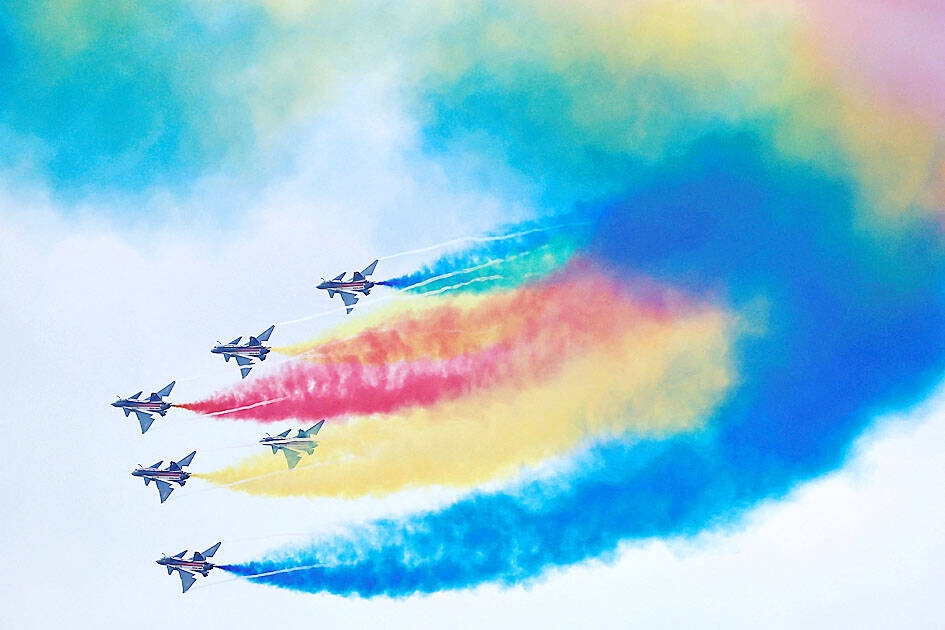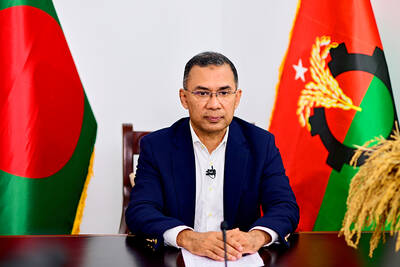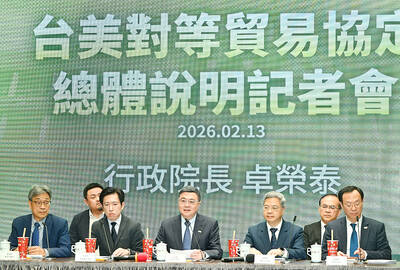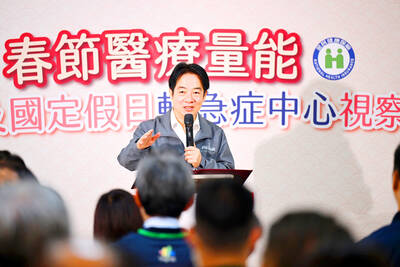Japan yesterday said that a Chinese military delegation was on a rare exchange visit as the Asian neighbors attempt to thaw frosty ties ahead of US president-elect Donald Trump’s inauguration on Monday next week.
Members of the Eastern Theater Command of the Chinese People’s Liberation Army were visiting their Japanese counterparts and senior Japanese defense officials from Monday through Friday, Japanese government spokesman Yoshimasa Hayashi said.
The trip was organized after the Japanese and Chinese defense ministers met in November last year in Laos on the sidelines of a regional defense gathering, where they agreed to increase exchanges among troops, Hayashi said.

Photo: Reuters
“For the first time in five years, this resumes exchanges among troops,” he told a regular news conference.
“The promotion of mutual understanding and trust through frank communication at commanders’ level will contribute to the building of constructive and stable relations between Japan and China. We think this visit contributes to the peace and stability of the region,” Hayashi said.
The Eastern Theater Command echoed the view.
“This visit will help enhance understanding and mutual trust between the two sides, and promote defense exchanges between China and Japan,” it said in a statement.
Japan and China have been trying to patch up relations that for years have been strained by territorial and historical disputes, as well as other issues.
To ease tensions, Japanese Minister of Foreign Affairs Takeshi Iwaya last month visited Chinese Minister of Foreign Affairs Wang Yi (王毅).
Japanese lawmakers were also visiting China this week, and Japanese Minister of Agriculture, Forestry and Fisheries Taku Eto is due in the country today.
Japanese National Security Adviser Takeo Akiba visited China in November last year and held talks with Wang. Tokyo is expected to invite Wang to Japan next month, seeking to pave the way for a state visit by Chinese President Xi Jinping (習近平), the Nikkei reported.

PEACE AT LAST? UN experts had warned of threats and attacks ahead of the voting, but after a turbulent period, Bangladesh has seemingly reacted to the result with calm The Bangladesh Nationalist Party (BNP) yesterday celebrated a landslide victory in the first elections held since a deadly 2024 uprising, with party leader Tarique Rahman to become prime minister. Bangladesh Election Commission figures showed that the BNP alliance had won 212 seats, compared with 77 for the Islamist-led Jamaat-e-Islami alliance. The US embassy congratulated Rahman and the BNP for a “historic victory,” while India praised Rahman’s “decisive win” in a significant step after recent rocky relations with Bangladesh. China and Pakistan, which grew closer to Bangladesh since the uprising and the souring of ties with India, where ousted Bangladeshi prime minister Sheikh Hasina

FAST-TRACK: The deal is to be sent to the legislature, but time is of the essence, as Trump had raised tariffs on Seoul when it failed to quickly ratify a similar pact Taiwan and the US on Thursday signed a trade agreement that caps US tariffs on Taiwanese goods at 15 percent and provides preferential market access for US industrial and agricultural exports, including cars, and beef and pork products. The Taiwan-US Agreement on Reciprocal Trade confirms a 15 percent US tariff for Taiwanese goods, and grants Taiwanese semiconductors and related products the most-favorable-treatment under Section 232 of the Trade Expansion Act, the Executive Yuan said. In addition, 2,072 items — representing nearly 20 percent of Taiwan’s total exports to the US — would be exempt from additional tariffs and be subject only to

NON-NEGOTIABLE: The US president’s action ran counter to one of the US’ ‘six assurances’ on not consulting China about arms sales to Taiwan, US lawmakers said US President Donald Trump’s admission that he is discussing arms sales to Taiwan with Chinese President Xi Jinping (習近平) is “alarming and a blatant violation of US policy and the six assurances,” US Representative Ro Khanna said on Tuesday. Trump on Monday said he would decide soon on whether to send more weapons to Taiwan, after Xi warned him not to do so. “I’m talking to him about it. We had a good conversation, and we’ll make a determination pretty soon,” Trump told reporters aboard Air Force One when asked about warnings raised by Beijing during a phone call with Xi over

REAL EMERGENCIES: To avoid overcrowding, the health minister urged people with mild or moderate symptoms to go to UCCs, while the ER should be for critical cases President William Lai (賴清德) yesterday inspected the nation’s Lunar New Year medical preparedness with a visit to an urgent care center (UCC) in Taipei and expressed confidence in the Ministry of Health and Welfare’s plans to prevent emergency room (ER) overcrowding during the nine-day holiday. The ministry in November last year launched a pilot UCC program to provide urgent medical care at 13 clinics in the nation’s six special municipalities over weekends and on holidays, aimed at relieving pressure on crowded ERs. To ease ER overcrowding during the Lunar New Year, when most hospitals and primary care clinics are closed, the National